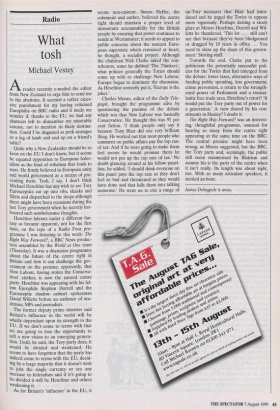Radio
What tosh
Michael Vestey
Areader recently e-mailed the editor from New Zealand to urge him to send me to the abattoirs. It seemed a rather exces- sive punishment for my having criticised Europhilia on BBC radio and it made me wonder if, thanks to the EU, we had any abattoirs left to dismember my miserable carcase, not to mention its likely destina- tion. Could I be disguised as pork sausages or a leg of lamb and end up on a friend's table?
Quite why a New Zealander should be so keen on the EU I don't know, but it seems he equated opposition to European feder- alism as the kind of tribalism that leads to wars. He firmly believed in European unity and world government as a means of pre- venting them. Tosh, I say. I don't think Michael Heseltine has any wish to see Tory Eurosceptics cut up into ribs, shanks and fillets and dispatched to the shops although there might have been occasions during the last Tory government when he secretly har- boured such unwholesome thoughts.
Heseltine labours under a different fan- tasy as became apparent, not for the first time, on the tape of a Radio Four pro- gramme I was listening to this week: The Right Way Forward?, a BBC News produc- tion assembled by the World at One team (Thursday). It was a discussion programme about the future of the centre right in Britain and how it can challenge the gov- ernment on the premise, apparently, that New Labour, having stolen the Conserva- tives' clothes, is now the natural centre party. Heseltine was appearing with his fel- low Europhile Stephen Dorrell and the Eurosceptic shadow cabinet spokesman David Willetts before an audience of aca- demics, MPs and journalists.
The former deputy prime minister said Britain's influence in the world will be Wholly dependant upon its strength in the EU. If we don't come to terms with that we are going to lose the opportunity to sell a new vision to an emerging genera- tion. Until, he said, the Tory party does, it would be divided and weakened. He seems to have forgotten that the party has indeed come to terms with the EU, decid- ing by a large majority that it doesn't wish to join the single currency or see any increase in federalism and if it's going to be divided it will be Heseltine and others weakening it.
As for Britain's 'influence' in the EU, it seems non-existent. Simon Heffer, the columnist and author, believed the centre right should maintain a proper level of democratic accountability for the British people by ensuring that power continues to reside at Westminster; it needs to appeal to public concerns about the nascent Euro- pean superstate which remained at heart, he thought, a socialist project. Although the chairman Nick Clarke asked the con- tributors, some he dubbed 'The Thinkers', what policies generally the Tories should come up with to challenge New Labour, Europe began to dominate the discussion. As Heseltine correctly put it, 'Europe is the joker.' Charles Moore, editor of the Daily Tele- graph, brought the programme alive by questioning the premise of the debate which was that New Labour was basically Conservative. He thought this was 95 per cent fiction. 'I think people only say it because Tony Blair did one very brilliant thing. He worked out that most people who comment on public affairs pay the top rate of tax. And if he were going to make them feel secure he would promise them he would not put up the top rate of tax.' No doubt glancing around at his fellow panel- lists, he added, 'I should think everyone on this panel pays the top rate so they don't feel so bad and threatened as they would have done and that lulls them into talking nonsense.' He went on to cite a range of un-Tory measures that Blair had intro- duced and he urged the Tories to oppose more vigorously. Perhaps darting a steely glare at Messrs Heseltine, Dorrell and Wil- letts he thundered, 'This lot . still can't see that because they've been bludgeoned or drugged by 18 years in office . . . You need to show up the sham of this govern- ment.' Stirring stuff.
Towards the end, Clarke put to the politicians the potentially successful poli- cies for the Tories that had emerged from the debate: lower taxes, alternative ways of funding public spending, less government, crime prevention, a return to the strength- ened power of Parliament and a transat- lantic free trade area. Heseltine's retort? 'It would put the Tory party out of power for a generation.' A view shared by his con- stituents in Henley? I doubt it.
The Right Way Forward? was an interest- ing, thoughtful programme, unusual for hearing so many from the centre right appearing at the same time on the BBC. The central premise might have been wrong, as Moore suggested, but the BBC, the Tory party and, seemingly, the public still seem mesmerised by Blairism and assume his is the party of the centre when it isn't really. Its length was about right, too. With so many articulate speakers, it needed an hour.


























































 Previous page
Previous page